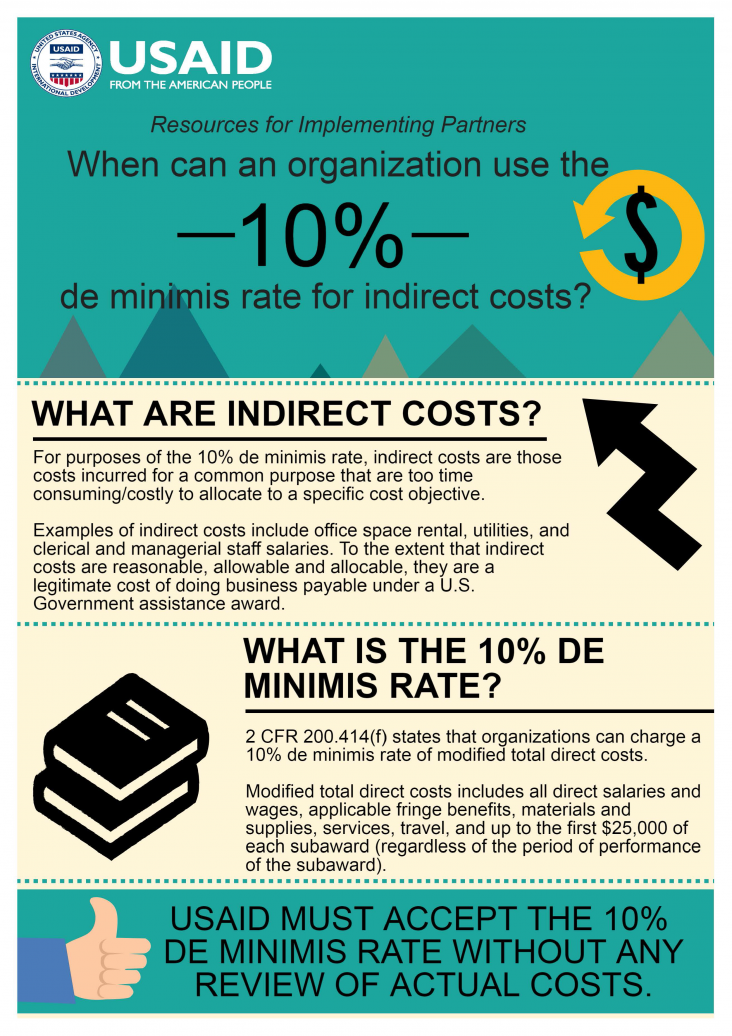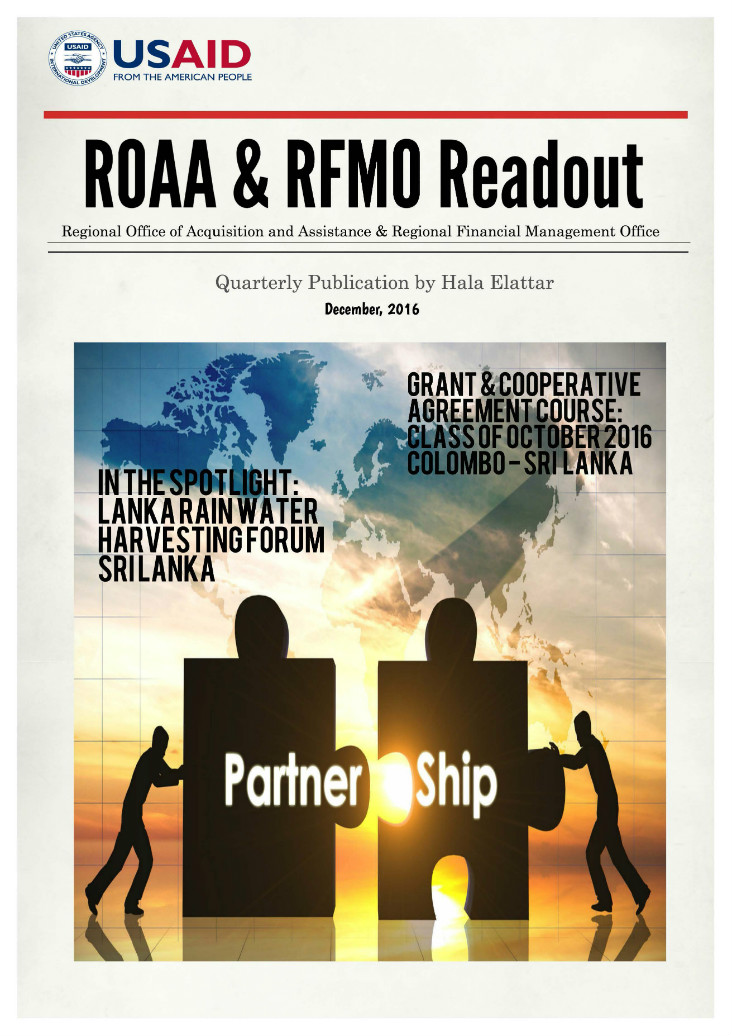Regional Office of Acquisition and Assistance & Regional Financial Management Office
Quarterly Publication by Hala Elattar
December, 2016
Grant and Cooperative Agreement Course: Class of October 2016, Colombo, Sri Lanka
In the spotlight: Lanka Rainwater Harvesting Forum Sri Lanka
Developing the Capacity of USAID Implementing Partners: USAID/India Grants Compliance Course
On Monday October 24, 2016, USAID/Sri Lanka welcomed 13 implementing partners and 19 USAID/Sri Lanka staff members to its first Grant and Cooperative Agreement Compliance course. The training is part of USAID India's Regional Office Acquisition and Assistance (ROAA) and Regional Financial Management Office (RFMO) local capacity building program, the five-day course engaged local, US, Public International Organizations and USAID staff to enhance their understanding of post award compliance requirements and improve performance.
Contracting Officer Robert Parnell and Chief Accountant Malory David kicked off the session with opening remarks and welcomed participants to the course. Trainers Christine Librizzi and Mollie Allers walked participants through the rules and regulations associated with Grants and Cooperative Agreements and covered the significant changes to USAID assistance policies and procedures that have been introduced in the last few years. The course also included financial and audit management sessions presented by USAID/Sri Lanka RFMO staff.
Trainers: Mollie Allers and Christine Librizzi
Activity Session
Upcoming Training Opportunity
USAID/India Grant Compliance Course
Feb 27 – March 3, 2017
The Leela Palace, New Delhi
Visit Us
https://www.usaid.gov/india
https://www.usaid.gov/india/work-with-us/partnership-opportunities
https://www.usaid.gov/work-usaid/resources-for-partners
RFMO/ROAA Tips: Guidance on De Minimis Rate
Who can use the 10% de minimis rate? The 10% de minimis rate for modified total direct costs can only be elected under an award by a non-profit organization that has never held an indirect cost rate agreement.

What are indirect costs?
For purposes of the 10% de minimis rate, indirect costs are those costs incurred for a common purpose that are too time consuming/costly to allocate to a specific cost objective. Examples of indirect costs include office space rental, utilities, and clerical and managerial staff salaries. To the extent that indirect costs are reasonable, allowable and allocable, they are a legitimate cost of doing business payable under a U.S. Government assistance award.
What is the 10% de minimis rate?
2 CFR 200.414(f) states that organizations can charge a 10% de minimis rate of modified total direct costs. Modified total direct costs includes all direct salaries and wages, applicable fringe benefits, materials and supplies, services, travel, and up to the first $25,000 of each subaward (regardless of the period of performance of the subaward).
Requirements for use of the 10% de minimis
The organization must include the 10% de minimis amount in its application and maintain documentation of costs included in its modified total direct costs.It must be used consistently across all USG awards. It is allowable for use indefinitely.
What if an organization proposes an indirect cost rate but has no NICRA?
The use of the 10% de minimis rate should not be used as the substitute by an organization that has an indirect cost rate simply because they have no NICRA. In this instance, the organization's proposed rate should be reviewed for propriety and honored if adequately supported.
Can administrative costs be included?
Administrative and clerical salaries should normally be treated as indirect costs (finance and administrative costs). In contrast, administrative and clerical salaries that can be identified specifically with a final cost objective, (ie. award), should be charged as a direct cost.
Where Can I Learn More?
2 CFR 200.414(f)
Appendix IV to Part 200—Indirect (F&A) Costs Identification and Assignment, and Rate Determination for Nonprofit Organizations
Reach out to your AO to discuss
Spotlight: Lanka Rain Water Harvesting Forum
“Let not a single drop of water that falls from the skies flow to the sea, without it being used for the benefit of man.” King Parakramabahu the Great – Sri Lanka (1153 – 1186 A.D.)
Lanka Rain Water Harvesting Forum (LRWHF) was established in early 1996 by a small group of people to bring professionals and practitioners together to research, promote, and foster rainwater harvesting in Sri Lanka. In 1997 LRWHF was registered as a social service organization under the Ministry of Social Services.
What is Rain Water Harvesting (RWH)?
It means catching and storing rain water in tanks to be used during the non-rainy season. More than 21,000 rain water harvesting systems are operational throughout the country mostly in rural areas. There, the stored water can be used for drinking, cooking, washing, and agriculture.
In urban areas, the collected water can be used for toilet flushing, washing, cleaning, laundry, and gardening. It is not recommended for drinking and cooking due to high level of air pollution and other contaminants.
Water Tank
Vision: “Leading the nation in rain water harvesting technology, construction and utlization to sustain water needs”
Mission: “Promote, create awareness and build capacity on rain water harvesting technology through facilitating, sharing and exchange of knowledge”
Q: Can you explain how you benefitted by the RWH system?
A: "Usually we fetch water from the tube well for all purposes. It is around 200m from home. It's too difficult because we [are ] forced to buy large buckets to collect water. After we got the RWH system, we got many advantages. When we fetch water from tube well to home, we were very tired. Now, we got relief and time is also saved. Using that time, I'm making a small garden surrounding the tank. Now I got pure water and pure vegetables. Thanks to LRWHF and USAID for supporting us." Mrs. Mudiyansage Manike, Agopura.
Q: How do you feel about rain water and the RWH system?
A: "It is very useful because we don't need to spend money and we don't need to spend time. Previously, we often got urine infection, but after drinking rainwater, the illness is very low. We don't have dug well or tube well, so we had to travel to get water, but now, we don't have that inconvenience. I can get water anytime at my home. Daily, we are consuming two pots of water in the morning and evening. My brother's family is also sharing our RWH tank water for drinking." Mrs. P. Padmalatha, Abgopura
Q: What do you think of the RWH system?
A: "It's a great gift for us. We have a cement open tank. We filled that by bowser water. Now I got a solution for all the problems. I use the plastic tank to collect overflow water from the rain water tank. Also we made a temporary gutter to collect water to the cement tank by using this idea. Previously I feared when water finished, now we have enough water because we save the overflow as well." Mrs. S. B. Udaya Wasantha Kumara, Agpopura
New Awards:
1. ROAA/India, Sri Lanka & Maldives is proud to announce that a new award has been executed with Ernst & Young LLP.
The purpose of this Grant is to contribute to the Government of India's "Swachh Bharat Mission" by developing a Hygiene Index (HI) to measure cities' current hygiene status and help in identifying areas of improvement and the associated investment required. The geographical spread of HI would be across urban India and the plan is to cover 25 cities by the end of the third year. The program will be supported by an "Ideation Lab", comprised of experts from renowned organizations (national/international) from the hygiene sector, government bodies, multilateral donor agencies, NGOs, media houses.
2. ROAA/India, Sri Lanka & Maldives is proud to announce that a new award has been signed with UNDP (Bhutan Parliamentary Support Program).
The purpose of this Grant is to support a multi-year strategic partnership between the UNDP and the Bhutanese Parliament. The overall objective of UNDP's Bhutan Inclusive Governance program is to enhance the capabilities of the Parliament, in particular to strengthen the legislative, oversight and representational role of the National Assembly and the National Council of Bhutan to build and sustain democracy and development, with the full participation of the people of Bhutan. The program will assist the Parliament in creating a conductive environment for more effective, accountable, transparent, but also responsive, inclusive, participatory and representative governance.
3) ROAA/India, Sri Lanka & Maldives is proud to announce that a new award has been signed with Deloitte Consulting LLP. The purpose of the Renewable Integration and Sustainable Energy Initiative (RISE) Task Order is to provide technical assistance to the Government of India (through USAID) for the purpose of integrating large quantities of intermittent renewable energy into the Indian grid (i.e., 'Greening the Grid’ (GtG)).
It will contribute to USAID/India’s Development Objective of Accelerating India’s transition to a high-performing, low emission, and energy secure economy. It will also ensure that integration issues do not become a significant barrier to the achievement of the significantly enhanced targets under the National Solar Mission and the new National Wind Mission. The project objective is to enhance the efforts of public and private stakeholders of India’s power system to better manage large-scale integration of Renewable Energy (RE) into the power grid. This will be achieved through improved planning of RE generation, transmission and system operation, and a series of innovation pilots that support integration of RE into the grid. GtG innovation pilots will involve key power sector stakeholders, including state utilities, regulators, load dispatch centers, national power sector entities, and the Indian and external private sector.
Agreement Officer Representative (AOR) of the Quarter: Madhu Ranjan In recognition of exemplary competence, reliability and teamwork
Did you Know?
New modules have been published to USAID's public website as part of the How to Work with USAID online series for partners, available at http://www.usaid.gov/work-usaid/get-grant-or-contract/trainings-how-work...
Hot Topics
This section is meant to provide guidance in the form of Q&A. We encourage you to submit your question(s) to helattar@usaid.gov. We will address them and feature the answer. We hope you will find this section helpful and informative.
Q: Are costs incurred during the 90 day window after the project end date but before the submission of the final report allowable?
A: Based on the Federal regulations, 45 CFR 74.28 and 92.23, where a funding period is specified, a grantee may charge only allowable costs resulting from obligations incurred during the funding period to the award. Therefore, the cutoff date for expenses for a project is the end date of the award . No costs incurred beyond that period is allowed to be charged to the project and claimed back from USAID. However there may be an exception where a partner may request for some closeout expenses (for example: retaining some key staff for final closure of the project, preparation of financial reports, retaining the rented place for additional 1-2 months to complete the closure of the project). In such case, they have to prepare a budget for such expenses and submit it to the Agreement Officer (AO) for approval. If the AO approves these expenses only then they can be claimed as final expenses beyond the project period.
Please direct questions or comments about this newsletter to Hala Elattar at helattar@usaid.gov








Comment
Make a general inquiry or suggest an improvement.